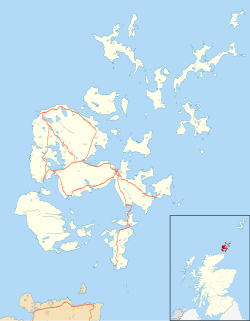Wideford Hill chambered cairn
Neolithic chambered cairn on Wideford Hill on Mainland, Orkney From Wikipedia, the free encyclopedia
Wideford Hill chambered cairn is a Neolithic chambered cairn on Mainland, Orkney in Scotland. The tomb dates to around 2000 BC, and is similar in design to the Maeshowe chambered cairn on Orkney. Historic Environment Scotland established the site as a scheduled monument in 1994.
 Wideford Hill chambered cairn | |
| Location | Mainland, Orkney, Scotland |
|---|---|
| Coordinates | 58°59′31″N 3°01′48″W |
| Type | Chambered cairn |
| History | |
| Periods | Neolithic |
| Site notes | |
| Ownership | Historic Scotland |
| Public access | Yes |
Description
The chambered cairn is located near Kirkwall on Mainland, Orkney in Scotland. The monument is situated on a steep west facing hill northwest of Wideford Hill and faces the Bays of Firth and Kirkwall.[1] It is similar in design to the Maeshowe burial monument, also located on Mainland, Orkney. The visible masonry shows the different construction stages of the Neolithic cairn with its three concentric walls built on an earthen platform. The monument has a stepped facade, but the original shape was probably rounded or conical, with the stonework covered in clay and turf.[1][2]
The monument was constructed on a steep slope and its entrance is on the west side. The entrance passage is low and narrow and takes up one third of the entire passage and is somewhat curved.
The inner passage, which is cut into the hill, is covered with lintel slabs and leads to a rectangular stone-lined chamber and three side chambers.[2] The side chambers are corbelled.[1] Entry to the tomb now is through a reconstructed concrete roof, completed during the 20th century.[3]
History
The tomb dates from the Neolithic era, approximately 2,000 BC. The site was excavated in the 1840s by George Petrie.[4] He did not uncover any human remains or other finds at the time and suggested that the burial monument had been filled with rubble and abandoned.[5] The main chamber had been previously filled with rubble. Historic Environment Scotland established the site as a scheduled monument in 1994.[1]
Images
The cairn is on a hillside. Below is the view looking West. Access to the cairn is via a hatch in the top and steep metal ladder. A torch is recommended, and one is provided on site.
See also
References
Wikiwand - on
Seamless Wikipedia browsing. On steroids.






